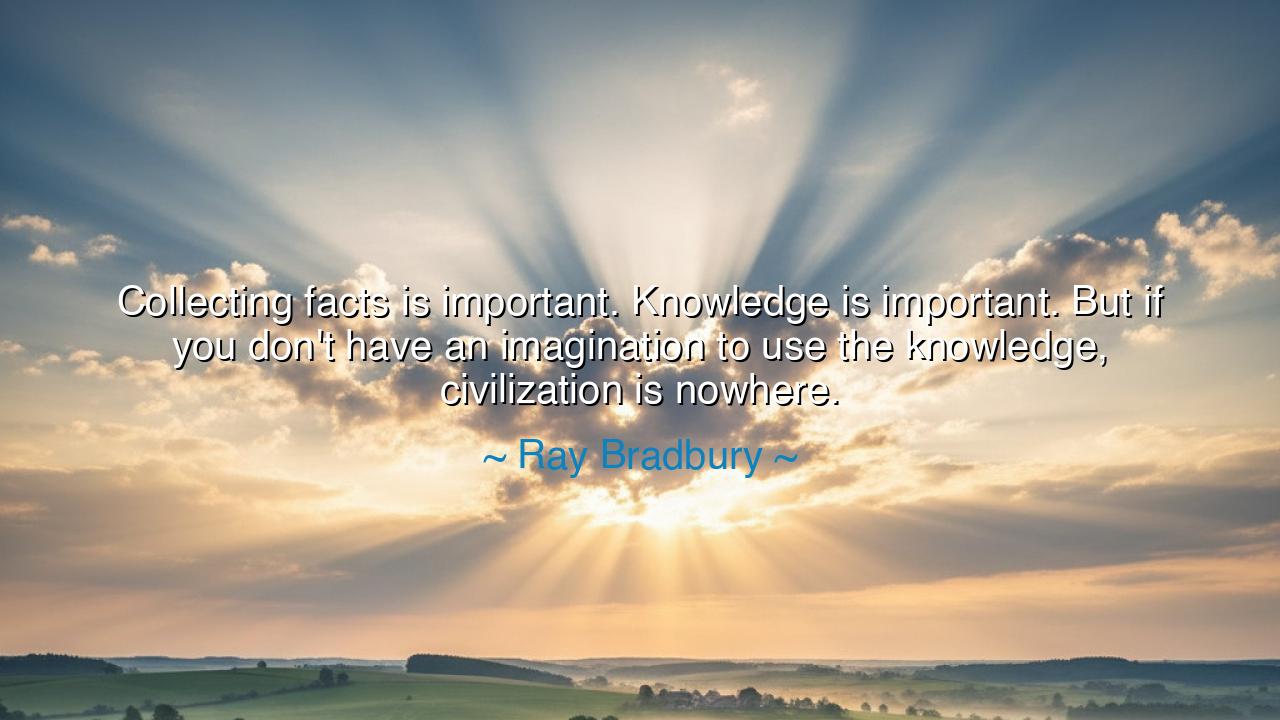
Collecting facts is important. Knowledge is important. But if you
Collecting facts is important. Knowledge is important. But if you don't have an imagination to use the knowledge, civilization is nowhere.






In the burning and prophetic words of Ray Bradbury, one of the great seers of the modern age, there resounds a truth as old as civilization itself: “Collecting facts is important. Knowledge is important. But if you don't have an imagination to use the knowledge, civilization is nowhere.” These are not the idle musings of a dreamer but the thunderous warning of a man who saw too clearly the dangers of an age obsessed with information and blind to inspiration. Bradbury, whose tales of wonder and warning filled the twentieth century with the light of foresight, reminds us that knowledge alone is not enough to sustain humanity. Without imagination — the sacred fire that gives knowledge purpose — we are a body without a soul, a machine without meaning.
The origin of this wisdom lies deep within Bradbury’s lifelong faith in the creative spirit. In his most famous works — Fahrenheit 451, The Martian Chronicles, Something Wicked This Way Comes — he warned against a future where men become so consumed by the collection of data and the worship of progress that they forget how to dream. His stories were filled with both awe and terror, for he saw that a civilization could possess all the facts of the universe and yet lose its humanity if it lacked the imagination to use them wisely. For what is science without vision? What is progress without purpose? The universe itself may overflow with knowledge, yet only imagination can give it meaning.
To collect facts is the work of the mind; to use imagination is the work of the soul. A society that values the one and neglects the other builds towers of stone but not temples of spirit. The ancients understood this balance. The philosophers of Greece, the builders of Egypt, the poets of the East — all sought to unite knowledge and imagination, reason and wonder, logic and myth. They knew that the intellect without the dream becomes a cold servant of power. The same truth echoes through Bradbury’s warning: civilization advances not through knowledge alone, but through the creative application of that knowledge — through the imagination that envisions a better world, even when facts alone say it cannot be done.
Consider the story of Albert Einstein, the man who unlocked the secret of relativity. He once said that imagination is more important than knowledge, for knowledge is limited, but imagination encircles the world. Einstein was a collector of facts, yes — a man of science and reason — but he was also a poet of thought. His discoveries were not born solely from calculation but from vision: he imagined himself riding on a beam of light. That vision, born of childlike wonder, gave birth to one of the most profound revolutions in science. Einstein proved what Bradbury later proclaimed: knowledge opens the door, but imagination walks through it.
Bradbury’s message is also a warning to the modern world, which drowns in data but thirsts for meaning. We live in an age where facts are at our fingertips, where knowledge is endless, and yet our hearts grow restless, our dreams grow dim. Information alone cannot save us — for the mere possession of knowledge does not grant wisdom. We can know the structure of the atom and still destroy ourselves with it; we can map the stars and still lose sight of our humanity. It is imagination, the moral and creative compass of the mind, that transforms knowledge into civilization. Without it, we are clever animals with no vision, builders of cities with no soul.
In every age, the greatest leaps of humankind have sprung from the marriage of knowledge and imagination. When Leonardo da Vinci looked at the anatomy of a bird, he saw not only muscle and feather, but flight — and from his imagination came the idea of the flying machine. When Marie Curie studied the invisible world of radiation, she saw not mere facts, but a light that could both heal and harm. These were not mere scholars; they were visionaries. They dared to dream beyond the boundaries of the known — and in doing so, they carried civilization forward. For as Bradbury reminds us, progress begins not with what we know, but with what we dare to imagine.
So, my child, take this teaching into your heart: collect facts, yes; seek knowledge, yes; but never forget to imagine. Let your learning be the soil, and your imagination the seed that gives it life. When you study, do not merely memorize — wonder. When you discover, do not only measure — dream. For facts without imagination are lifeless stones; imagination without knowledge is rootless wind. The true builder of civilization is the one who unites them, turning wisdom into art, invention into compassion, and truth into beauty.
And remember the eternal flame that Ray Bradbury sought to keep alive: that imagination is not a luxury but a necessity. It is the breath of the soul, the power that turns knowledge into creation and creation into civilization. Guard it fiercely. Feed it daily. For when the fires of imagination go out, the world grows cold — and when they burn, even the smallest mind can light the stars.






AAdministratorAdministrator
Welcome, honored guests. Please leave a comment, we will respond soon